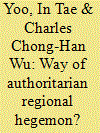| Srl | Item |
| 1 |
ID:
180452


|
|
|
|
|
| Summary/Abstract |
The Trump administration has shown a strong inclination to play the “Taiwan card” and strengthen relations with Taipei in lieu of Washington’s traditional strategic ambiguity. As the U.S.-China trade competition escalated after 2018, the contending bilateral relations between Beijing and Washington created an opportunity for the administration of Tsai Ing-wen to adopt a more provocative strategy toward Beijing. In order to prevent conflict resulting from Taiwan’s new approach, more fundamental discussions on the definitions and dynamism of why the United States should adjust this traditional security policy are needed, this research suggests, in order to address the question of whether the United States should change to strategic clarity across the Taiwan Strait or adhere to its traditional strategic ambiguity. Moreover, this study also covers relevant literature on strategic ambiguity, investigating the changing patterns of decision making in U.S. foreign policy with regard to cross-Strait relations and U.S. arms sales to Taiwan.
|
|
|
|
|
|
|
|
|
|
|
|
|
|
|
|
| 2 |
ID:
186843


|
|
|
|
|
| Summary/Abstract |
How has China contributed toward the conclusion of the Regional Comprehensive Economic Partnership (RCEP)? The extant literature tends to either undervalue China’s role or emphasizes the absence of China’s willingness to realize the RCEP. However, it is difficult to form region-wide multilateral preferential trade agreements (PTAs), such as RCEP, without any significant contribution from a regional hegemon, such as China. This paper, thus, argues that China has contributed significantly toward the conclusion of RCEP by engendering incentives for member countries to join through multiple cooperative structures. These cooperative structures involve China-led bilateral PTAs and international development forums, which include the Belt and Road Initiative and Asian Infrastructure Investment Bank. With the gradual shift from bilateral to multilateral PTAs and forum-linkage strategies, China turned to be more assertive in concluding the RCEP than in the early years of RCEP negotiations, as evidenced by the discourse of political and opinion leaders.
|
|
|
|
|
|
|
|
|
|
|
|
|
|
|
|
| 3 |
ID:
168194


|
|
|
|
|
| Summary/Abstract |
This article investigates whether countries in East Asia are acting anomalously from traditional balancing and bandwagoning assumptions in the face of China's reemergencel the form of sending ambiguous alignment signals toward the United States in return for more autonomy by states that have no official alliance with Beijing. Incorporating Lim and Cooper's redefinition of hedging, this study focuses on the conditions under which China's neighbors adopt hedging behaviors. This article aims to show that coercive capability indicators, including national capability and a US military presence, are major factors in decisions by countries in East Asia to adopt hedging strategies. The findings suggest that when countries in this region seek to maximize economic benefits with Beijing, they also seek certain security assurances from Washington as a hedge against Beijing's influence over their national affairs.
|
|
|
|
|
|
|
|
|
|
|
|
|
|
|
|